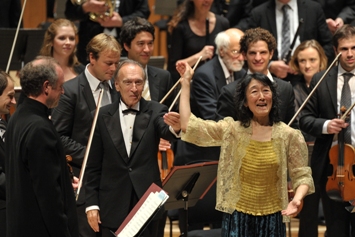We're living through a golden age of Bruckner conducting. A revolutionary age. Young sparks like Yannick Nézet-Séguin and Ilan Volkov are doing extraordinary things with the Austrian's music, experimenting with speeds and phrasing, reshaping him in a more extraterrestrial, more lithe and modern mould. All of which means that trying to get yourself noticed conducting Bruckner in the 2010s is a bit like trying to get yourself noticed as a footballer in 1970s Brazil. Good luck.
But before we got a chance to assess whether the living legend Claudio Abbado made the grade in his performance of Bruckner Five, we had Dame Mitsuko Uchida's dreamy swim through the Schumann Piano Concerto to investigate. The last time I heard Uchida play Schumann at the Royal Festival Hall, it looked more like she was kneading bread than playing a keyboard. She delivered last night's performance in such a spirited way that the infrequent return of the smudgy, dough-beating activity hardly mattered. Besides, we were being treated to so many passages of foamy soft tenderness that we had little to complain about.
As I listened to an uncharacteristically brutish, loud and characterless opening movement, I thought, was Bruckner getting the better of Abbado?
Admittedly the lack of muscle to the left-hand grabs and the ponderous speeds, particularly in the final movement, weren't ideal. (I wouldn't want my Schumann to come served only this way.) But if you just succumbed to Uchida-land - such an attractively liminal world ultimately - one could go home very satisfied. The numerous beautiful duets she developed with the wind soloists of the Lucerne Festival Orchestra (including the characterful clarinet of Stefan Schilling) was worth listening to alone. (Pictured below: Uchida and Abbado take the audience's applause)

Only in the final bars did I think I know the answer. Looking back, it appeared that Abbado might have been intentionally pushing the granitic quality of the opening to its monolithic limits in order to make us thirst after and finally become awestruck by the transformation in the finale. At least that's how I rationalised the almighty metamorphosis of the orchestra over the the course of the next three movements. In the slow a thaw began, a colourful delicacy (the exquisite flute of Jacques Zoon, for example) peering out through the icy rocks.
With the arrival of the Scherzo, the thaw turned to a full-blown rebirth. Had the evening ended there, I might have wondered why Abbado hadn't injected the first movement with the same life and swing. But then came the epic finale and fugue, and what sounded like an explanation. Here, as the musical themes split, ran, collapsed and collected like streams off a mountain side, the work starting to teem with life, Abbado's reading finally began to make perfect and wondrous sense.
A high-risk strategy that Abbado could and did totally pull off. With the majestic subtleties of voicing and balancing (which had been so absent in the opening movement) suddenly coming into play, the final polyphony became unforgettably glorious. He even had the audacity to bring out the fleeting return of a tiny two-bar theme on the flutes in the last fortissimo climax, hushing the rest of the orchestra for a few seconds to allow our ears to catch a glimpse of this glistening little scale. For that alone, Abbado deserved a standing ovation. And he got one.













Add comment